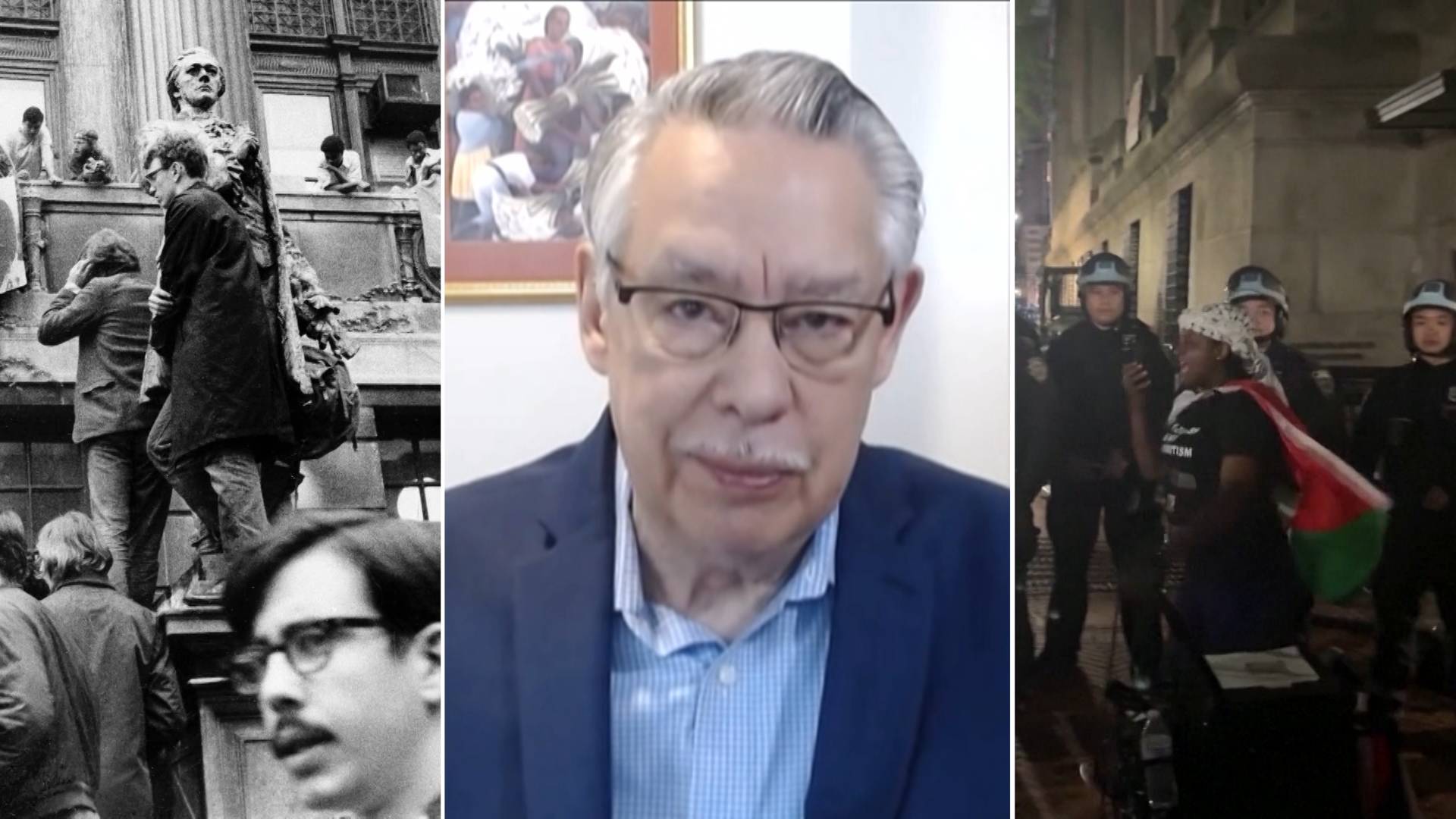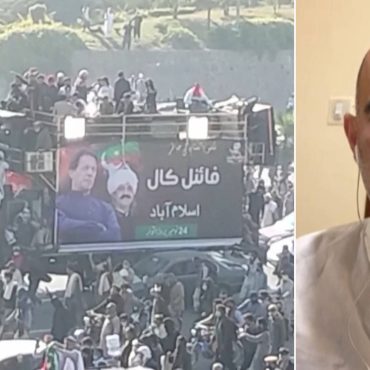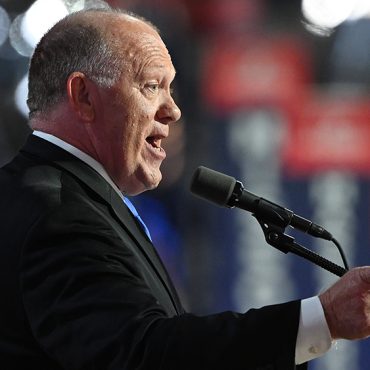This is a rush transcript. Copy may not be in its final form.
AMY GOODMAN: This is Democracy Now!, democracynow.org. I’m Amy Goodman, with Juan González. And it’s Juan we’re going to turn to next.
The massive police raid on Columbia University last night came 56 years to the day after a similar raid by police quashing an occupation, or attempting to, of Hamilton Hall by students protesting racism and the Vietnam War. A week into the historic 1968 student strike, on April 30th, New York City police stormed the campus. Hundreds of students were injured, 700 arrested. The campus newspaper the Columbia Spectator’s headline read, in part, “Violent Solution Follows Failure at Negotiations.”
Juan, you were there. Juan González, you were a leader of the Columbia revolt. You were one of the founders of the New York chapter of Young Lords. Yesterday we played archival clips of you and the other students taking over Hamilton Hall. What were your thoughts as you watched what happened with the student takeover and then the police raid?
JUAN GONZÁLEZ: Well, Amy, I think the similarities are really amazing in terms of the persistence of these students, the issues around which they were fighting, this opposition to a genocidal war occurring in Gaza.
And, you know, I was struck especially by the stands of these university presidents, not only at Columbia and Barnard, but also across the country. You know, the great Chris Hedges, I think, said it best, when he talked recently about the moral bankruptcy of these presidents of these universities who are condemning disruptions of the business as usual at the universities, while every single president of an American university has been silent about the massive destruction of universities in Gaza and of high schools and schools in Gaza by the Israeli army. They are silent about what is occurring in education in another country, another part of the world, financed by the United States.
So, I think that the importance to me in terms of the similarities are the students understand that at times you must disrupt business as usual to focus the attention of the public on a glaring injustice. And I think that’s exactly what they’ve been able to do. The entire country today knows what divestment means, what divestment means from the Israeli government and the Israeli military, whereas, before, this issue was on the margins of political debate. No commencement in America will occur in the next month where the war in Gaza is not a burning issue, either outside with the protesters or inside in the speeches and presentations. So I think that the students have managed to focus the entire attention of the country on an unjust war.
I don’t see how President Shafik survives. Many of these presidents across the country are going to be known not for whatever they accomplished previously, but they are going to be known throughout the rest of their lives as being the people who brought the police in to crush students who were maintaining a moral position of opposition to genocide.
So, I think the students are going to carry — those who were arrested are going to carry this badge of courage, as opposed to this profile of cowardice of the university presidents that dare to try to suspend or expel them. And the students’ lives have been changed forever — and, I think, for the best — in terms of the importance of dissent and opposition to injustice.
AMY GOODMAN: Juan, I wanted to go back to 1968, the student strike, students occupying five buildings, including the president’s office in Low Library, barricading themselves inside for days, students protesting Columbia’s ties to military research and plans to build a university gymnasium in a public park in Harlem. They called it Gym — G-Y-M — Crow. I want to go to a clip of you from the Pacifica Radio Archives, then a Columbia student, speaking right — it was before the raid, during the strike.
JUAN GONZÁLEZ: Now we want to go into the dorms with all of you, with some of you who may not — who may not agree with a lot of what we’ve been saying here, who have questions, who support us, who want to know more. Let’s go to the dorms. Let’s talk quietly, in small groups. We’ll be there, and everyone in Livingston — in Livingston lobby, in Furnald lobby, in Carman lobby. We’ll be there, and we’ll talk about the issues involved, and we’ll talk about where this country is going and where this university is going and what it’s doing in the society and what we would like it to do and what we would — and how we would like to exchange with you our ideas over it. Come join us now.
AMY GOODMAN: So, that is Democracy Now! co-host Juan González when he was a student at Columbia University in 1968. It was before the police raid. Juan, tell us what happened after the police raid of Hamilton Hall, as they did last night of Hamilton Hall, 700 arrests. In fact, Juan, you only recently graduated from Columbia. This is the 56th anniversary. What was it, 50 years later, a dean at Columbia said, “Please, we need you as a graduate”?
JUAN GONZÁLEZ: No, actually, it was 30 years later they gave me my degree, because I was a senior then. I was supposed to graduate that year. And, you know, amazingly, being suspended from college is not a big deal. You know, it only delays your career a little bit, and I think you gain more sometimes if you were suspended for the right reason. So I don’t think that that’s a big issue.
But I want to raise something else about these protests that I think people — I’ve seen little attention to. Back in the ’60s, most of the student protests were led either by Black students who were in Black student organizations or white students. I was one of the few Latinos at Columbia at the time. And today, these student protests are multiracial and largely led by Palestinian and Muslim and Arab students. This is a marked change in the actual composition of the American university that we’re seeing in terms of the leadership of these movements. And I think the willingness of these administrations to crack down so fiercely against this protest is, to some degree, they find it easier to crack down on Black and Brown and multiracial students than they did back then, when it was largely a white student population. And they always figured out a way to rescind the suspensions or get the students their degrees, because they saw them as part of them. Now, I think, they’re seeing these student protests as part of the other, and they are much more willing to crack down than they have been in the past. And I think it’s important to raise that and to understand what is going on in terms of the changing demographics of the American college student population.
AMY GOODMAN: Well, Juan, thanks so much for being with us today and co-hosting. Juan González, student leader of the 1968 Columbia revolt, one of the leading journalists today in the United States.
Coming up, it’s May Day. We go to the University of Southern California, what is the labor union and worker movement, how it links to Gaza solidarity. Back in 20 seconds.











Post comments (0)